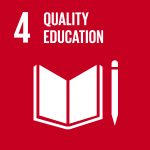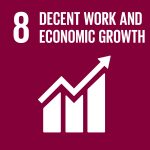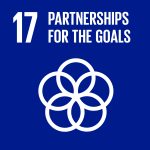Esta web utiliza cookies para que podamos ofrecerte la mejor experiencia de usuario posible. La información de las cookies se almacena en tu navegador y realiza funciones tales como reconocerte cuando vuelves a nuestra web o ayudar a nuestro equipo a comprender qué secciones de la web encuentras más interesantes y útiles.
Democratizing knowledge - MITx MicroMasters Programs
Description
Institution
Organizations/areas of the university involved
MIT Center for Transportation & Logistics / MIT Office of Digital Learning
Country
United States
The goals of this case study are to introduce the impact on “learners” and “learning” of the MITx MicroMasters Program in Supply Chain Management (SCM), and secondly, to show how this case can contribute to the SDG goals transforming the Higher Education System.
Open online learning is revolutionizing the traditional educational landscape, both residential and also distance learning education systems. MicroMasters programs started in 2015 at the Massachusetts Institute of Technology (MIT), and provide deep learning in a specific career field. These include a series of MOOCs (massive open online courses) which often equate to graduate level courses at top institutions. Beyond course credit, MicroMasters programs are also designed to advance learners’ careers. A MicroMasters credential is a standalone certificate recognized by employers for its real job relevance. Once a MicroMasters credential is obtained, students may apply to various Masters programs. If accepted, students can get credit for their online courses and pursue an accelerated graduate program on campus. This innovative process is also called ”inverted admissions” – accepting students on the basis of demonstrated competence in a domain, in place of standardized test scores of undergraduate grades.
The three main principles of the MicroMasters in SCM are: first, to democratize knowledge; second, to provide a credential at a modest fee; and third, to offer a pathway to a master’s degree at top universities. These innovative programs are opening the door to anyone from anywhere. There are no pre-requisites to enroll in this program, one only needs a computer and internet connectivity. MITx MicroMasters is bringing MIT education to anyone. It is also a pathway to a Master’s Degree at MIT and at universities across the world that are recognizing the MicroMasters as a pathway for credit (currently more than 20 universities across the world).
In summary, this program is transforming the higher education system in three ways: first, providing accessibility to higher education at top universities for free; secondly, opening the door to non-traditional students to a master’s degrees at top-level institutions; finally, encouraging a new way to teach on-campus (we are redesigning the way we teach on-campus).
Results and impact measured or expected
Success factors:
1. More than 270,000 unique learners registered from 196 countries!
2. Almost all countries are represented in this program
3. More than 18,000 unique learners pursuing for a certificate
4. Almost 10,000 unique learners earned a certificate in one course
5. More than 1,500 MicroMasters Credential holders (learners who passed the whole program).
6. First cohort of Blended Master’s degree successfully completed the program at MIT (Cambridge, MA) and at ZLC (Zaragoza Logistics Center, Spain). The second cohort will graduate in June 2019 from three different institutions, MIT, ZLC and Luxembourg. They earned a Master of Engineering in SCM Degree or Masters of Applied Science in SCM)

Connection with the SDG framework
The case study will connect with the SDG framework, covering the following objectives:
4- Quality Education. The goal of this program is to democratize education and bring MIT education to anyone from anywhere for free. Contents and rigorous assessments of the program are equivalents to graduate-level courses at MIT.
8- Decent work and economic growth. MicroMasters credential holders reported to us in a survey conducted in 2018 that: 1) the credential helped them to grow in their local companies; 2) the credential helped them to get a new job; 3) the credential helped them increase their income. The survey shows how this global program is impacting local people.
17- Partnerships for the goals. We currently signed agreements with more than twenty universities across the world (in North America, Central and South America, Europe, Asia, and Australia) that are offering a pathway to a master degree for MicroMasters holders. Connecting a global education program with local universities.
Barriers and follow up
We believe that blended education is the future of higher education. Online education is a great way to teach certain topics and contents. Still, face-to-face education are required to go further, to discuss complex problems and case studies, to develop certain skills, etc. Collaboration with other universities and organizations are critical to offer these blended programs at local areas.
There are many current challenges when you want to provide the best learning experience and a rigorous assessment in a massive, open and online learning environment. Among others:
• How and what should be taught at scale?
• How do we accurately assess at scale?
• Balance between interactive learning space and a rigorous performance assessment
• Engage learners in online and massive environments
• It takes a village!
We are currently working in better understanding learners’ behavior in online and blended programs. Our goal is to increase engagement and improve their learning experience.
Education 4 SDG funciona gracias a WordPress



